I’ve struggled with insomnia since freshman year of high school (for context, that was 14 years ago.) I don’t know what happened in the transition from grade school to high school that made my ability to sleep take a nosedive. *Besides all the changes in hormones, teenage stress, harder schoolwork, peer pressure, FOMO – you know, nothing serious.* But even after going through college and getting into real adulthood, the struggle to get a full night’s sleep hasn’t gone away. Most troubled sleepers are probably with me in feeling like you’ve tried everything. Believe me, I know. I’ve tried every sleep trick in the book and to be honest, most of them are complete BS. So I wanted to compile a list of the 7 best tips to sleep better, that I’ve found actually work.
7 Simple Tips to Sleep Better
While I’ve never actually been diagnosed with insomnia, the definition from Mayo Clinic describes my nightly sleep issues perfectly:
“Insomnia is a common sleep disorder that can make it hard to fall asleep, hard to stay asleep, or cause you to wake up too early and not be able to get back to sleep. You may still feel tired when you wake up. Insomnia can sap not only your energy level and mood but also your health, work performance and quality of life.” (1)
I’ve tried everything from melatonin, to CBD, to blackout curtains, to cutting out caffeine, to no screen time hours before bed (and that’s only the tip of the iceberg.) Some of these tips work for a bit… Then I’ll be right back to where I started (laying in bed for hours on end, feeling frustrated, staring at the inside of my eyelids.)
So while I’m not a doctor or sleep professional (merely a girl who’s struggled with sleep for half of her life)… I thought I could use my endless search for better sleep to share some tips that actually help. And hopefully, can benefit you if you’re in the same sleepless boat as I’ve been.
I should let you know ahead of time: none of these tips are going to magically cure your sleep. I still have nights that I lay in bed for hours, even when I feel like I’ve done everything right. But they’ve helped me to be able to get a good 7-8 hours most nights, and that’s a huge improvement from how things used to be.
So take from these tips what you will. I really hope that a few of them help though.
Disclaimer: This article is for informational purposes only, and is based on my own personal experience and research. It should not substitute for medical advice from a doctor or medical professional.
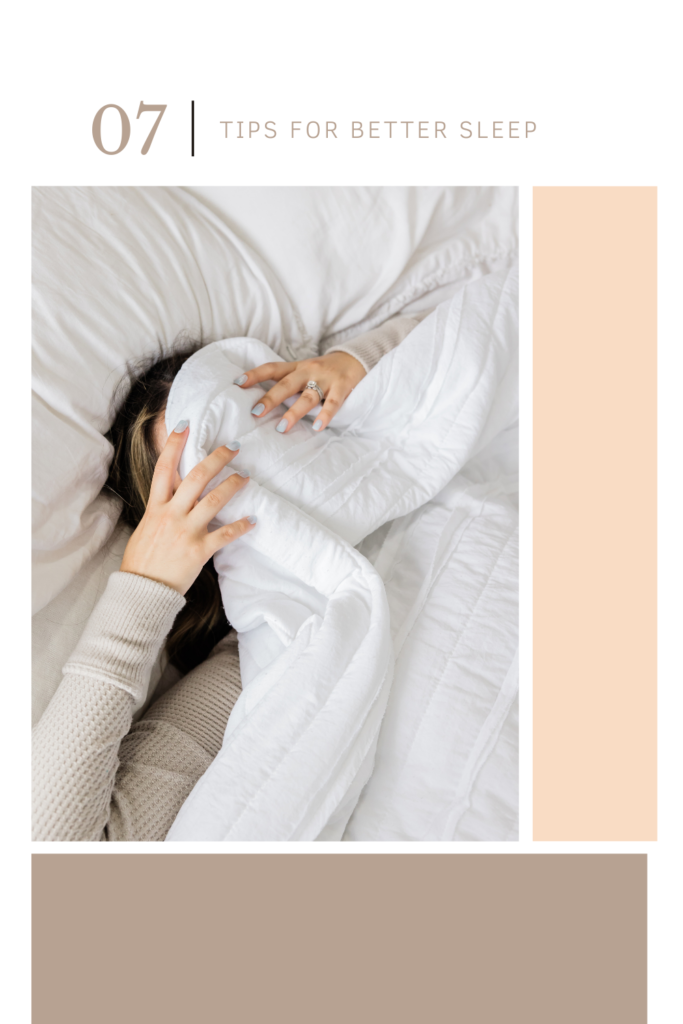
1. Stop stressing about needing a certain amount of sleep
I know, easier said than done, right? My fiance and my dad (and a few other lucky few) can fall asleep as soon as their head hits the pillow. It just comes naturally. They don’t think about it that much. Sounds magical, right?
I’ve never been the type of person to not worry about getting enough sleep. After years of sleepless nights and wasting more time laying in bed than actually sleeping, it’s hard to have a relaxed mindset on sleep. But it doesn’t have to be that way.
A few things I’ve found that help ease my sleep anxieties include:
- Making a list of everything on my mind that I need to get done tomorrow
- Journaling out any thoughts/stressors bouncing around in my head
- Most importantly: Realizing that even if I don’t get 8 hours of sleep, I’ll still be okay the next day. It’s not the end of the world. I might be grumpy and a little less focused, but I can still go to work, do my daily tasks, and be a human.
#3 has been the biggest mindset shift for me, but it’s not always easy to convince myself. Obviously, I’d rather get a perfect 8 hours of sleep and wake up feeling rejuvenated, energized, and ready to take on the day. But for troubled sleepers, that’s not always realistic or possible.
It helps to take some of the pressure off of sleep. Sleep is important and I’ll never deny that – but putting extra pressure on yourself to get a specific amount of sleep doesn’t help.
It only adds to the thoughts swirling around in your brain at night (“I should be asleep by now.” “Oh no, it’s 1 am now and I have to be up at 8, it’s already too late for me!” “I’ll never be able to get enough sleep, it’s just not in the cards for me.”)
Try to switch your mindset to “It’s great if I get 8 hours of sleep, but I’ll also be okay if I don’t.” Even if 7-8 hours is still your sleep goal – removing some of the pressure could help you actually accomplish it more often.
2. Read something boring
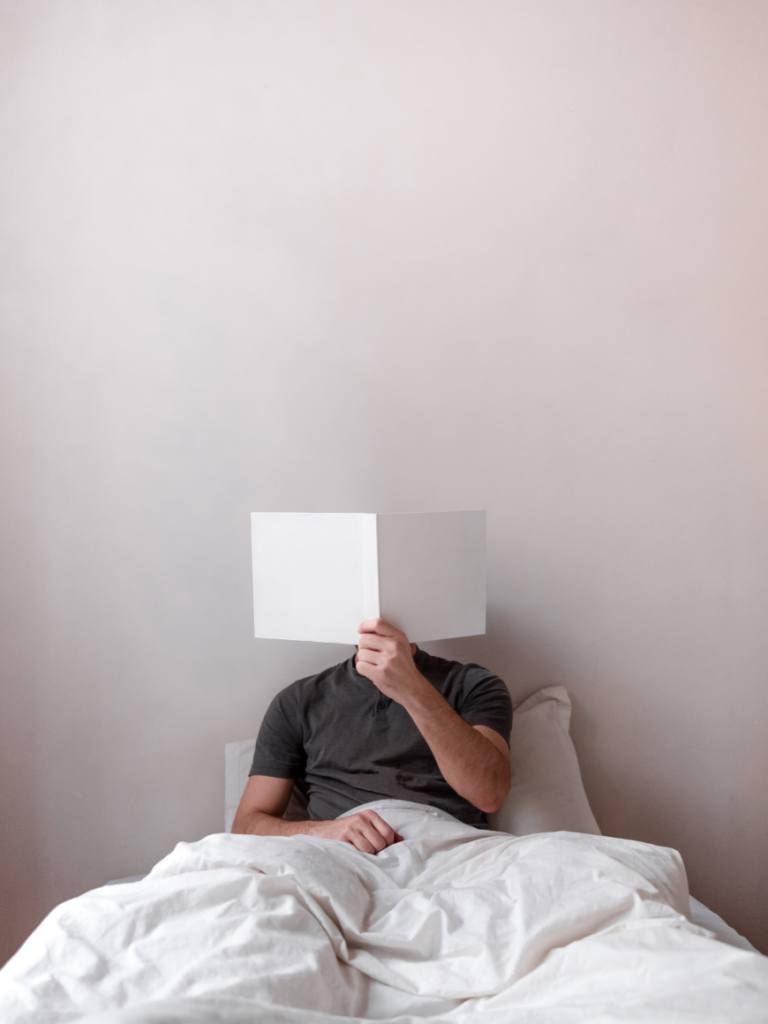
We all know that reading before bed is a better precursor for sleep than binging Netflix or scrolling through Instagram. But if you pick up an intense thriller or a can’t-put-down romance, is that really going to help you fall asleep?
I love reading before bed, but if I’m in the middle of a fiction that I can’t seem to put down, I’ll spend hours into the night reading. It doesn’t matter that I’m ~reading~ instead of watching TV – if I’m really into the book, it’s not going to help me fall asleep.
I’ve found that before bed is the best time to read that non-fiction that you really want to learn about, but doesn’t actually seem that interesting.
It might take you 6 months to get through it (because you can only read 2 pages a night before you get bored.) But it’ll certainly put you in a sleepier mood than a fiction you’re fully engrossed in.
3. Dim the Lights
I know this seems obvious, but it’s something that comes pretty unnaturally to me. I’m sure a lot of us phone addicts who can’t stay off social media would say the same.
Try to make the hour before bed a blue light-free hour. I know it’s much easier said than done, but it’s hard to fall asleep while processing an endless stream of information (aka the internet.)
Dim the lights, or wind down in a room with yellow light instead of white light. If you have a Kindle, lay in bed with the lights dimmed (or turned off) and read.
Being exposed to light 2 hours before bed and 1 hour after waking up has the most impact on our circadian rhythms. The later you’re exposed to bright light, the later you’ll naturally want to fall asleep (and wake up the next morning.) (2)
As troubled sleepers, we can definitely benefit from this. If you can figure out your regular sleep schedule, try to dim the lights and stay off bright technology an hour or two before bed. There’s a feature on iPhone called “Wind Down” that’ll darken the screen and basically lock you out of your phone before bed.
When you wake up in the morning, open the windows and let some sun in. Or even better, get outside on a walk.
4. Keep a consistent sleep schedule (that actually works for you.)
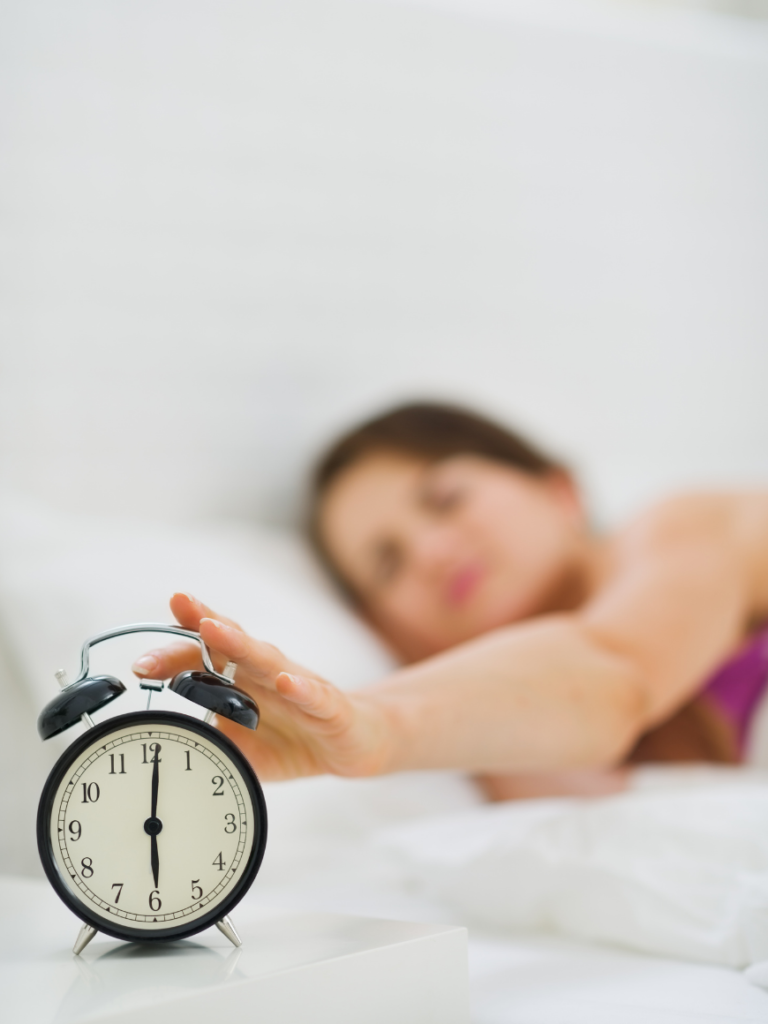
If I hear one more person say how waking up at 5 am changed their life, I’m going to lose it.
Mostly because I’m jealous of anyone who can consistently wake up at 5 am (while actually getting enough sleep to be productive.) But also because you don’t actually need to wake up at 5 am to be productive. Especially if you’re not naturally a morning person or regularly have trouble getting enough sleep.
That being said, figuring out a sleep/wake time that works for you (and sticking with it) can seriously benefit your sleep. I used to go to bed whenever I wanted to during college. Some days it’d be 11 pm, other days it’d be 4 am – there was absolutely no consistency.
Once I started working a 9-5 job a few years back, I was forced to stick with a consistent sleep schedule during the week. At this point, I had no expectation that it would benefit my sleep and just thought it’d be annoying to have to wake up at 7 every day.
I was surprised to find that I actually started sleeping much better with a consistent schedule.
I started to feel tired every night around 11 pm (even on weekends, which was annoying.) It became a challenge to stay up past 11, so naturally, I’d go to bed earlier and wake up earlier. Most days, I’d wake up before my alarm even went off.
The caveat with this is that you have to find a sleep schedule that you can actually stick to. It needs to be realistic for your day-to-day routine. If you work until 10 pm every night and don’t get home until 11, it’s probably not realistic to have a 5 am morning routine.
On the other hand, if you have to be up at 6 am every day for work, regularly getting into bed by 10 pm will probably benefit you.
Take inventory of your current sleep schedule, and think about what a more ideal sleep schedule would be. Set a daily alarm for the same time. (I use Alarmy so I don’t have to remember to set my alarm every night.) Try your best to stick with this schedule even on the weekends, while realizing that life happens and it’s not possible to stay consistent 100% of the time.
5. Exercise Regularly
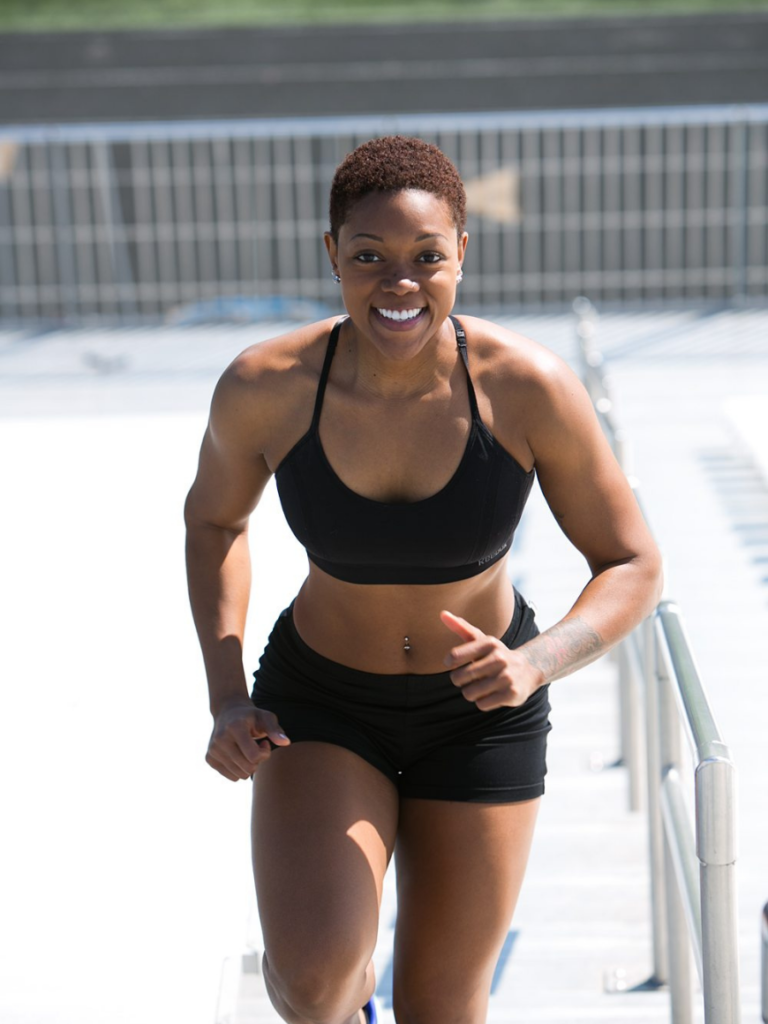
This is a health & fitness blog, so you know I had to squeeze this one in somewhere. 😉 There are so many benefits of exercise, but a lot of time sleep is overlooked for other more exciting/marketable benefits.
Fitting in 30 minutes of activity almost every day (even if it’s just a walk or stretching in front of the TV) has really helped my sleep. I’ve found that if I don’t move my body for a couple of days, I feel restless when it comes time to go to bed.
30 minutes of exercise in a day can improve sleep that same night. You don’t need to start getting insane amounts of exercise (ex: training for a triathlon) to see an improvement in sleep. (3)
I’ve found that working out in the morning or midday works best for me. If I try to exercise after 7-8 pm, I’ll end up way too energized afterward to even think about sleep. Find what works for you though because everyone’s different.
If you need some workout inspiration or want to switch up your routine, we post a bunch of our workouts over on Instagram.
6. The Great Debate: To Late Night Snack or Not?

I’ve heard very strong opinions on both sides of this topic. Some people think eating before bed is the worst thing you can do for your health. Some people believe it’ll make you gain weight. I’m definitely not in those camps on this issue (if you can’t already tell…)
Personally, I can’t fall asleep if I feel hungry. Even if I’m just a little hungry for a snack, I’ll lay in bed for hours not being able to sleep.
So for me, eating a snack before bed is a must. And guess what? I’ve never magically gained weight from eating before bed. Or seen any other adverse health effects. The only effect I see is that I’m able to actually fall asleep.
While a bedtime snack works great for me, it’s important to figure out what works for you. I know other people that if they eat before bed, it keeps them awake at night. Or upsets their stomach. It truly depends on what works for you.
So try out both sides of this. Eat a bedtime snack every night for a week, then try the opposite next week. See which way you feel better going to sleep.
Or maybe some nights you’re a little hungry because you ate an early dinner, so you want a bedtime snack. And other nights you’re still full from dinner, so you skip out on the snack that night. It’s okay to switch things up and do what feels best, night by night.
TL/DR: If you feel hungry at night, eat a bedtime snack. If you’re not hungry before bed (or eating before bed keeps you up), don’t eat a bedtime snack. Just figure out what works for you.
7. To Supplement or Not to Supplement?
I think it’s fair to say that a lot of people who struggle with sleep have tried (or thought about trying) a sleeping pill of some sort. Whether it be melatonin, a natural supplement like chamomile, or prescription sleeping pills, there are a lot of options out there.
Personally, I don’t want to start taking a prescription sleeping pill because I don’t think I’d ever want to stop taking it. Which probably wouldn’t be great for my ability to fall asleep naturally. So for me, that’s not going to happen.
I’ve tried melatonin in a couple of different forms as well as a natural sleep aid.
The ones I’ve tried that have worked pretty well for me are Olly sleep gummies and Zzzquil Pure zzzs (melatonin free).
Both of these are pretty subtle and just help me to wind down and feel a little more calm/ready for sleep. I only take them on nights that I’m feeling wide awake and know that I need to be up at a certain time in the morning.
It’s up to personal preference and if you want to try any sort of sleep supplement (and your doctor’s recommendation.) For me, it’s nice to know I have a “backup” of sorts, for nights that I really don’t feel tired. For other people I know, they would never try a sleep aid because they don’t want to feel reliant on it. As I’ve said a million times, it’s whatever works for you & your body.
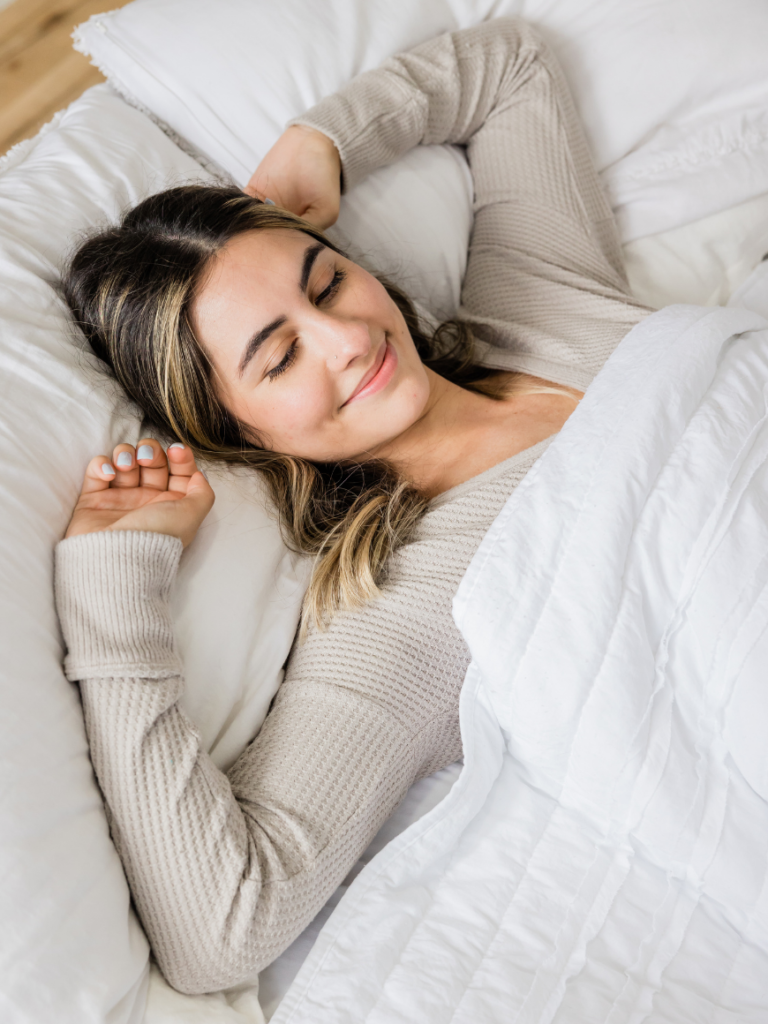
Final Thoughts
I hope you found a few of these tips helpful and they let you get a few extra hours of good shut-eye. If you have anything to add that’s worked for you in your ~sleep journey~ let me know in the comments. Or leave a comment with which of these tips worked best for you. 🙂
If you’re looking for other ways to improve your life (including decluttering, goal setting, and a life-changing mindset shift) check out my New Year Reset post next.
Until next time – talk to you later!
Come connect with us on:
Disclosure: This post contains affiliate links, which we may earn a small commission from (with no extra cost to you). Thank you for your support!
Sources for “7 Simple Tips to Sleep Better”
- https://www.mayoclinic.org/diseases-conditions/insomnia/symptoms-causes/syc-20355167
- https://www.cdc.gov/niosh/emres/longhourstraining/light.html
- https://www.hopkinsmedicine.org/health/wellness-and-prevention/exercising-for-better-sleep

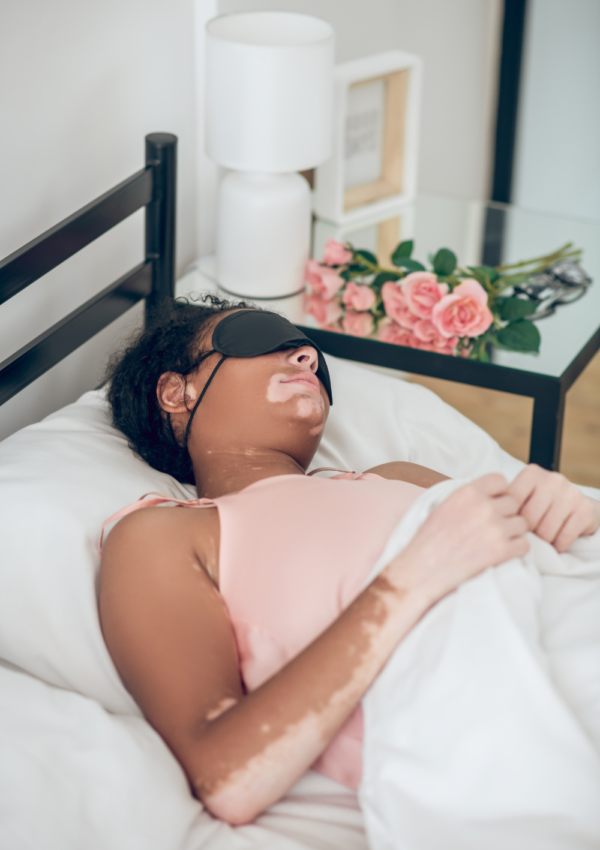

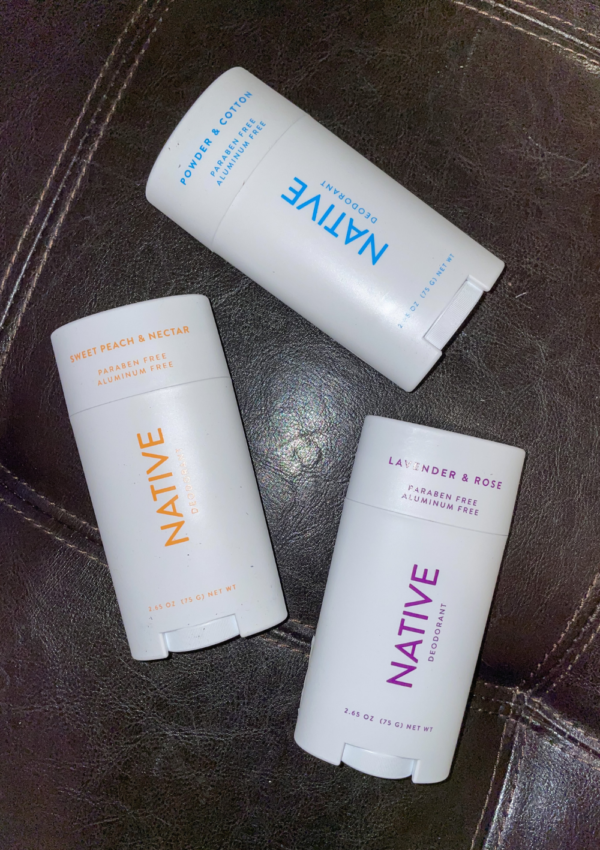



I must thank you for the efforts youve put in penning this site. I am hoping to check out the same high-grade blog posts by you in the future as well. In fact, your creative writing abilities has motivated me to get my very own blog now 😉